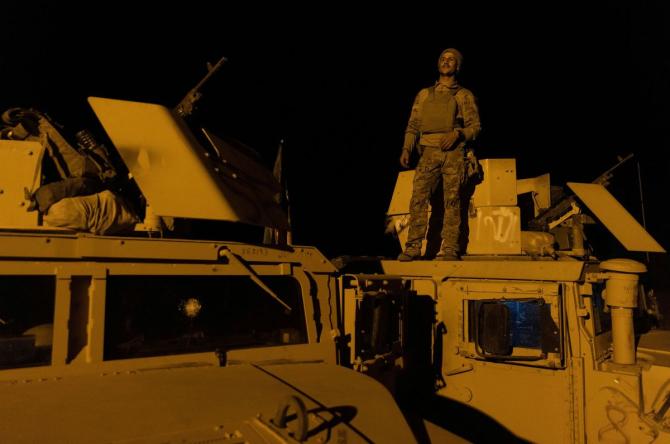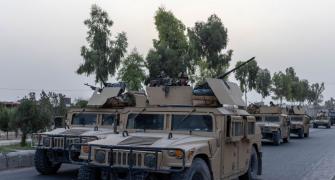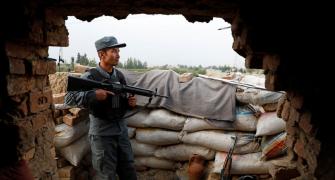But why should India be talking to the Taliban in the first place? There is no love lost there.
India will never forget or forgive the humiliation to which the Taliban subjected it in the IC-814 hijack, notes Shekhar Gupta.

This photograph was taken by Danish Siddiqui for Reuters three days before the Pulitzer Prize-winning photojournalist was murdered by the Taliban.
As the key Jammu and Kashmir alliance announced its acceptance of Prime Minister Narendra Modi's invitation for the all-party meeting in New Delhi, Mehbooba Mufti said that India should also talk to Pakistan to find a final solution to the Kashmir issue.
And then asked, somewhat rhetorically, 'If India is talking to the Taliban, what's wrong with talking to Pakistan?'
Good question. But why should India be talking to the Taliban in the first place? There is no love lost there.
India will never forget or forgive the humiliation to which the Taliban subjected it in the IC-814 hijack.
Nor would the Taliban care much for India, given its umbilical connection with Pakistan and India's support to the elected governments in Kabul. What changed now?
This was the spark that made us look west instead of the east, where we've been focused for more than a year now, thanks (but no thanks) to the Chinese, the Quad, Indo-Pacific, and so on.
The strategic outlook has shifted for India from the east to the west for now.
And for the US, this landmass to the west of India has just emerged as a most strategically important region.
India is talking to the Taliban because the Taliban are winning.
In their earlier manifestation as the Mujahideen, conservative Afghans, mostly rural and illiterate, had defeated the Soviet Union at the peak of its power.
They did it with massive assistance from the US, Pakistan, Saudi Arabia, China, and more.
Now, as the Taliban, the same lot has defeated the sole superpower in the world.
They've done so with only Pakistan's help. The reason is the Americans, from one administration to another, did not know what their objectives were. Was it to destroy al-Qaeda?
By the time they did that, large sections of al-Qaeda had morphed into ISIS.
When they finally killed Osama bin Laden, he was just an ineffectual and lonely wreck of a former terror titan.
Even his al-Qaeda lieutenants were not bothering to respond to his letters. One of them founded the ISIS unit in Baghdad.
When is it that the US could declare victory and return? If the objective was to finish Afghanistan as a sanctuary of terror, it was never going to happen unless similar results were also achieved in Pakistan.
In the vast zones bordering Afghanistan, and also in the minds that rule the GHQ in Rawalpindi.
Book after book showed the world how the ISI and Pakistan army double-crossed the Americans.
They couldn't get the success they were getting against al-Qaeda without Pakistan's help.
Therefore, they didn't have the leverage to insist the Pakistanis cut their ties with the Taliban.
The Taliban didn't care about casualties and destruction and most sanctuaries deep inside Pakistan were out of bounds for American drones.
That's why the Americans have now retreated from their longest war in defeat.
The only way they can make it look better, or 'less worse', as the familiar Americanism goes, is by demonstrating that they leave Afghanistan reasonably stable, and that the Taliban can be taken on their word that they won't allow any terror networks to come up again.
The last thing the Americans now need is for India to start 'playing' in Afghanistan or for it to become the battleground for India-Pakistan rivalry again.
That's why it is good for them too that India and the Taliban are talking.
India is acknowledging that reality. It can't covet the US as the pivotal Quad ally in the east and work at counter-purposes with it in the west.
That is why India's connecting with the Taliban. It follows that India and Pakistan have to stabilise their relationship, too.
If they are actively at odds with each other along the LoC, their differences will spill over into Afghanistan too.
And then, with the Taliban in power, who knows, the ISI might be tempted to use them to unleash towards India.
Further, neither India nor the US wants the new turn in Afghanistan to become Pakistan's victory.
This should put in context the big surprise of the India-Pakistan ceasefire as well.
It had obviously been in the works, with the help and urging of the US, although you can't call that third-party intervention. Friends always reason with each other.
This new engagement in Kashmir is the logical next step.
Both sides, the Modi-Shah government and the Kashmiri leaders, have dismounted the tigers they were riding.
For New Delhi, the 'anti-national Gupkar Gang' is now fellow patriots who can be accommodated.
A big, orchestrated and forcible demographic change in the Kashmir Valley is neither plausible nor possible.
Both sides have gotten off their maximalist positions.
The Gupkar Alliance no longer insists on return to the pre-August 5 status with Article 370, and the Centre has given up the quest for dumping the 'discredited old dynasties' and hopefully handing J&K back as a full state only when the new leadership being built by it is strong enough.
This is a good opening for Pakistan as well. The Financial Action Task Force (FATF) threat has not cleared yet.
In fact, even the FATF meeting decided to continue keeping Pakistan on the grey list.
Between this and American pressure, it's no longer feasible for it to carry out any spectacular terror attacks in India beyond Kashmir.
And if it is Kashmir, it gets an immediate response on the LoC. That's a losing cause.
India faces a stark reality in the Valley as well.
Contrary to the expectation that with central rule terrorism will vanish, it has actually become stronger as resentment has grown.
I read fine journalist-writer Rahul Pandita's book The Lover Boy of Bahawalpur.
Besides startling insights into how the Pulwama case was cracked, the standout point is that almost the entire lot of 'foot-soldiers' in Jaish-e-Mohammed, the most Pakistani of all groups, is local Kashmiri youth.
Only a leader or two are sent from Pakistan.
The status quo, therefore, is becoming counter-productive.
Looking further west, there is change in Iran too.
Ebrahim Raisi is an acknowledged conservative, hardliner, and likely heir apparent to Khamenei.
But the Biden administration would hope he will have the political capital to restore the nuclear deal.
If so, the Iran markets and oil supplies will open up.
It will be good for everybody in the region.
From Kashmir in India, across the Central Asian highlands into Iran, it is the same land-mass, with deep and wide demographic, ethnic and religious links.
This is how and why the picture is changing.
No big nation wants to be in a two-front situation.
Joe Biden set up his summit with Vladimir Putin first because he realised that the US could not be at odds with both Russia and China at the same time.
The commentary I read says he gave Mr Putin what he wanted: Respect as the leader of another superpower.
He hopes that will keep him from getting hyphenated with China.
Similarly, for Mr Modi, the active two-front situation after Galwan is unsustainable and dangerous.
That's why the thaw with Pakistan became a strategic imperative.
We can round off this argument by returning to answer Mehbooba's question that sparked it: 'India is talking to Mehbooba because it is talking to the Taliban.' And, India is talking to Pakistan too. Just not about what she might want on the agenda.
By Special Arrangement with The Print










